Anpassungsfähigkeit und Resilienz des Finanzsystems
Diese Forschungsgruppe untersucht kritische Aspekte der Anpassungsfähigkeit und Widerstandsfähigkeit von Finanzsystemen. Sie analysiert die Auswirkungen von Naturkatastrophen auf Finanzsysteme, die Auswirkungen politischer Präferenzen für die grüne Transformation und die Bedeutung von Kultur in den Volkswirtschaften.
Forschungscluster
Finanzresilienz und RegulierungIhr Kontakt

Mitglied - Abteilung Finanzmärkte
PROJEKTE
07.2016 ‐ 12.2018
Relationship Lenders and Unorthodox Monetary Policy: Investment, Employment, and Resource Reallocation Effects
Leibniz-Gemeinschaft
We combine a number of unique and proprietary data sources to measure the impact of relationship lenders and unconventional monetary policy during and after the European sovereign debt crisis on the real economy. Establishing systematic links between different research data centers (Forschungsdatenzentren, FDZ) and central banks with detailed micro-level information on both financial and real activity is the stand-alone proposition of our proposal. The main objective is to permit the identification of causal effects, or their absence, regarding which policies were conducive to mitigate financial shocks and stimulate real economic activities, such as employment, investment, or the closure of plants.
01.2015 ‐ 12.2019
Interactions between Bank-specific Risk and Macroeconomic Performance
Deutsche Forschungsgemeinschaft (DFG)
Referierte Publikationen
On the Nonexclusivity of Loan Contracts: An Empirical Investigation
in: Management Science, Nr. 12, 2016
Abstract
We study how a bank's willingness to lend to a previously exclusive firm changes once the firm obtains a loan from another bank ("outside loan") and breaks an exclusive relationship. Using a difference-in-difference analysis and a setting where outside loans are observable, we document that an outside loan triggers a decrease in the initial bank's willingness to lend to the firm, i.e., outside loans are strategic substitutes. Consistent with concerns about coordination problems and higher indebtedness, we find that this reaction is more pronounced the larger the outside loan and it is muted if the initial bank's existing and future loans retain seniority and are protected with valuable collateral. Our results give a benevolent role to transparency enabling banks to mitigate adverse effects from outside loans. The resulting substitute behavior may also act as a stabilizing force in credit markets limiting positive comovements between lenders, decreasing the possibility of credit freezes and financial crises.
Foreign Funding Shocks and the Lending Channel: Do Foreign Banks Adjust Differently?
in: Finance Research Letters, November 2016
Abstract
We document for a set of Latin American emerging countries that the different nature of foreign funding accessed by foreign and local banks affected their lending performance after September 2008. We show that lending growth was weaker for shock-affected foreign banks compared to shock-affected local banks. This evidence represents valuable policy information for regulators concerned with the stability and well-functioning of banking sectors.
Decision-making Power in Foreign Subsidiaries and Its Effect on Financial Constraints: An Analysis for Selected European Transition Economies on the Basis of the IWH FDI Micro Database 2013
in: Eastern European Economics, Nr. 6, 2016
Abstract
This article analyzes whether the distribution of decision-making power between the headquarters and foreign subsidiaries of multinational enterprises (MNEs) affects the foreign affiliates’ financial constraints. The findings show that not much decision-making power has as yet been moved from headquarters to foreign subsidiaries in European post-transition economies. The high concentration of decision-making power within the MNE’s subsidiary points toward higher financial constraints. However, a nonlinear effect is found, which suggests that financial constraints within the subsidiary only increase with more decision-making power when the power granted to the subsidiary is at a low level. For subsidiaries that already have autonomy in decision-making, granting more power in this regard has no effect on financial constraints.
Relative Peer Quality and Firm Performance
in: Journal of Financial Economics, Nr. 1, 2016
Abstract
We examine the performance impact of the relative quality of a Chief Executive Officer (CEO)’s compensation peers (peers to determine a CEO's overall compensation) and bonus peers (peers to determine a CEO's relative-performance-based bonus). We use the fraction of peers with greater managerial ability scores (Demerjian, Lev, and McVay, 2012) than the reporting firm to measure this CEO's relative peer quality (RPQ). We find that firms with higher RPQ earn higher stock returns and experience higher profitability growth than firms with lower RPQ. Learning among peers and the increased incentive to work harder induced by the peer-based tournament contribute to RPQ's performance effect.

Bank Recapitalization, Regulatory Intervention, and Repayment
in: Journal of Money, Credit and Banking, Nr. 7, 2016
Abstract
We use prudential supervisory data for all German banks during 1994–2010 to test if regulatory interventions affect the likelihood that bailed-out banks repay capital support. Accounting for the selection bias inherent in nonrandom bank bailouts by insurance schemes and the endogenous administration of regulatory interventions, we show that regulators can increase the likelihood of repayment substantially. An increase in intervention frequencies by one standard deviation increases the annual probability of capital support repayment by 7%. Sturdy interventions, like restructuring orders, are effective, whereas weak measures reduce repayment probabilities. Intervention effects last up to 5 years.
Arbeitspapiere
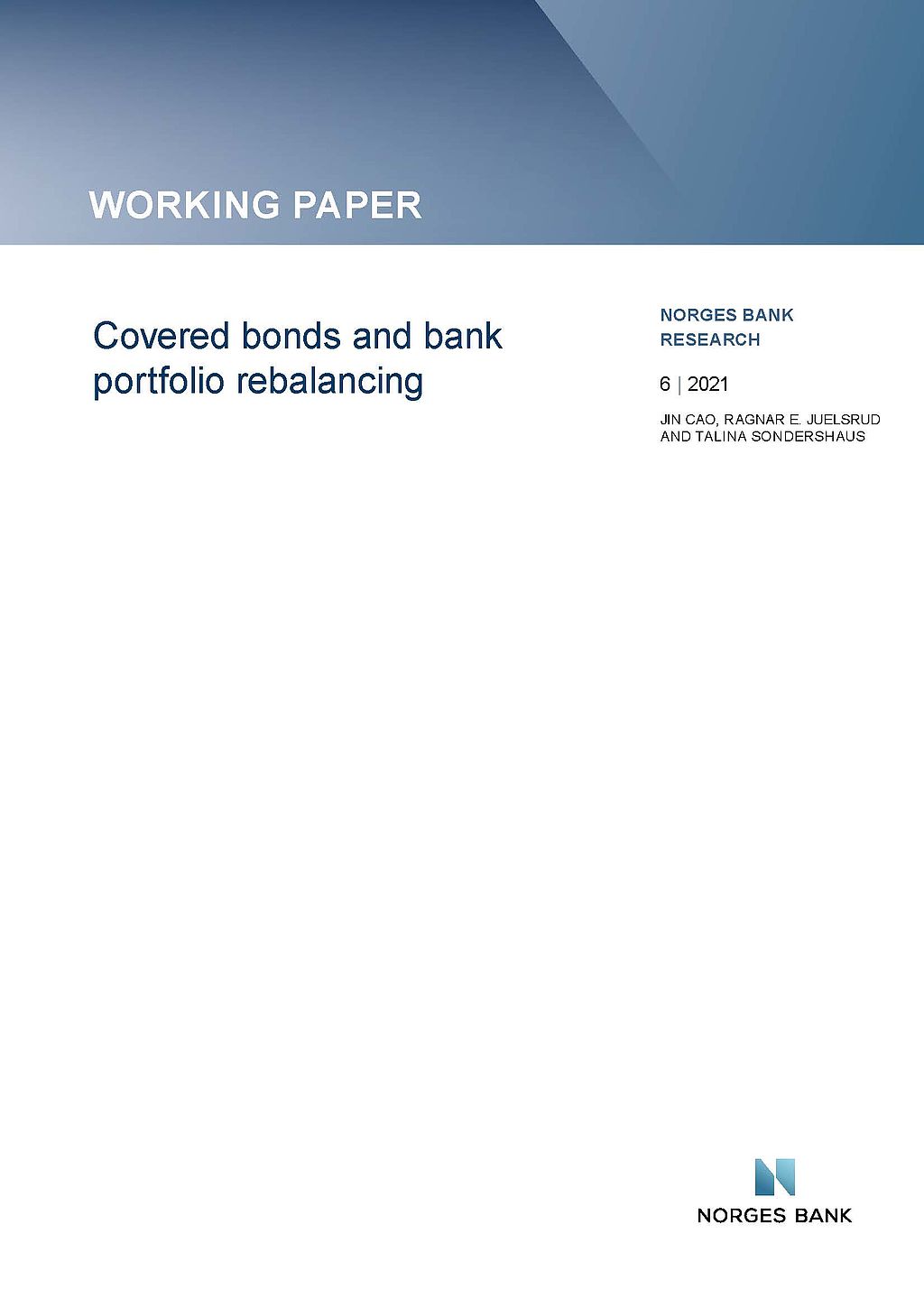
Covered Bonds and Bank Portfolio Rebalancing
in: Norges Bank Working Papers, Nr. 6, 2021
Abstract
We use administrative and supervisory data at the bank and loan level to investigate the impact of the introduction of covered bonds on the composition of bank balance sheets and bank risk. Covered bonds, despite being collateralized by mortgages, lead to a shift in bank lending from mortgages to corporate loans. Young and low-rated firms in particular receive more credit, suggesting that overall credit risk increases. At the same time, we find that total balance sheet liquidity increases. We identify the channel in a theoretical model and provide empirical evidence: Banks with low initial liquidity and banks with sufficiently high risk-adjusted return on firm lending drive the results.
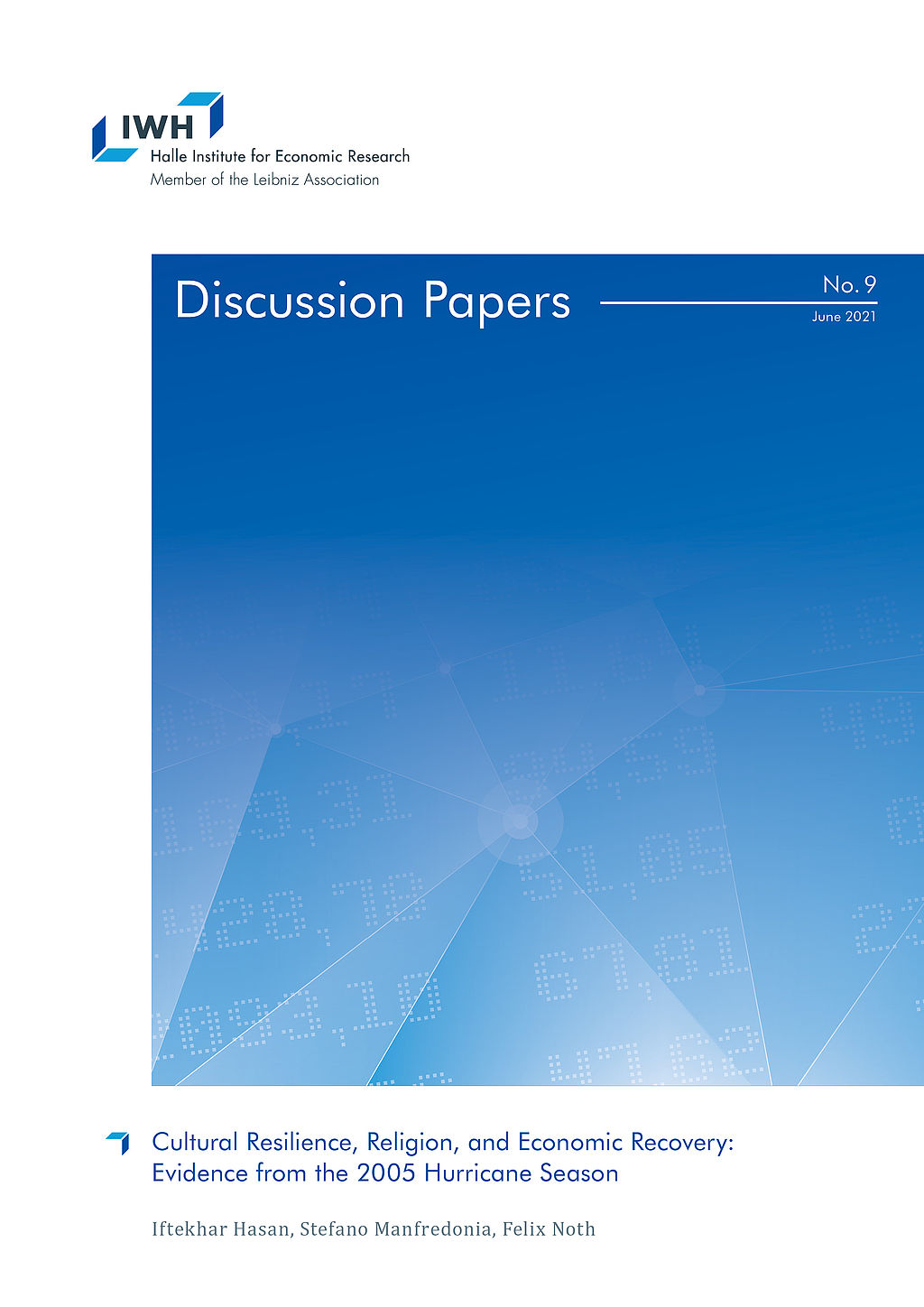
Cultural Resilience, Religion, and Economic Recovery: Evidence from the 2005 Hurricane Season
in: IWH Discussion Papers, Nr. 9, 2021
Abstract
This paper investigates the critical role of religion in the economic recovery after high-impact natural disasters. Exploiting the 2005 hurricane season in the southeast United States, we document that establishments in counties with higher religious adherence rates saw a significantly stronger recovery in terms of productivity for 2005-2010. Our results further suggest that a particular religious denomination does not drive the effect. We observe that different aspects of religion, such as adherence, shared experiences from ancestors, and institutionalised features, all drive the effect on recovery. Our results matter since they underline the importance of cultural characteristics like religion during and after economic crises.
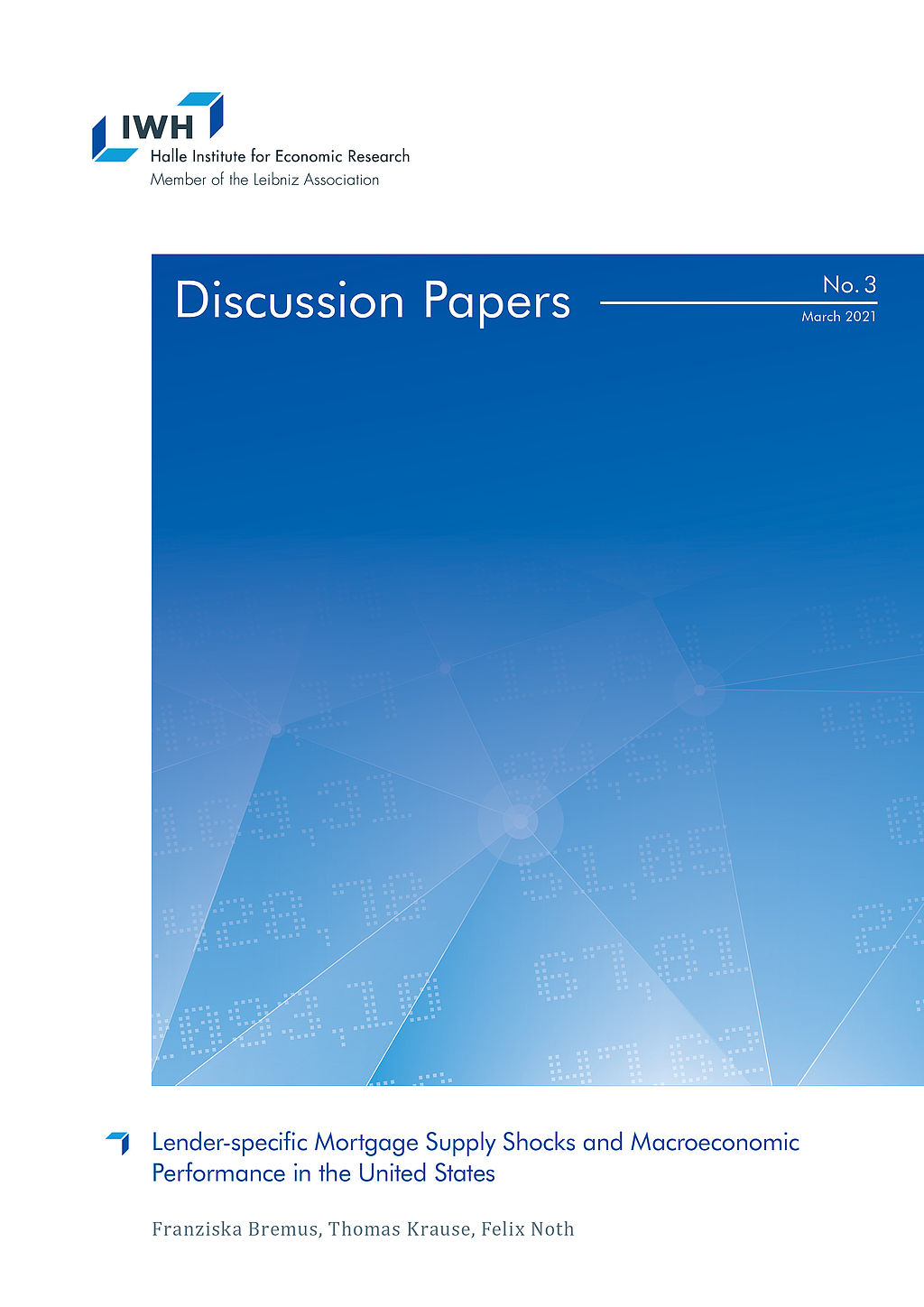
Lender-specific Mortgage Supply Shocks and Macroeconomic Performance in the United States
in: IWH Discussion Papers, Nr. 3, 2021
Abstract
This paper provides evidence for the propagation of idiosyncratic mortgage supply shocks to the macroeconomy. Based on micro-level data from the Home Mortgage Disclosure Act for the 1990-2016 period, our results suggest that lender-specific mortgage supply shocks affect aggregate mortgage, house price, and employment dynamics at the regional level. The larger the idiosyncratic shocks to newly issued mortgages, the stronger are mortgage, house price, and employment growth. While shocks at the level of shadow banks significantly affect mortgage and house price dynamics, too, they do not matter much for employment.
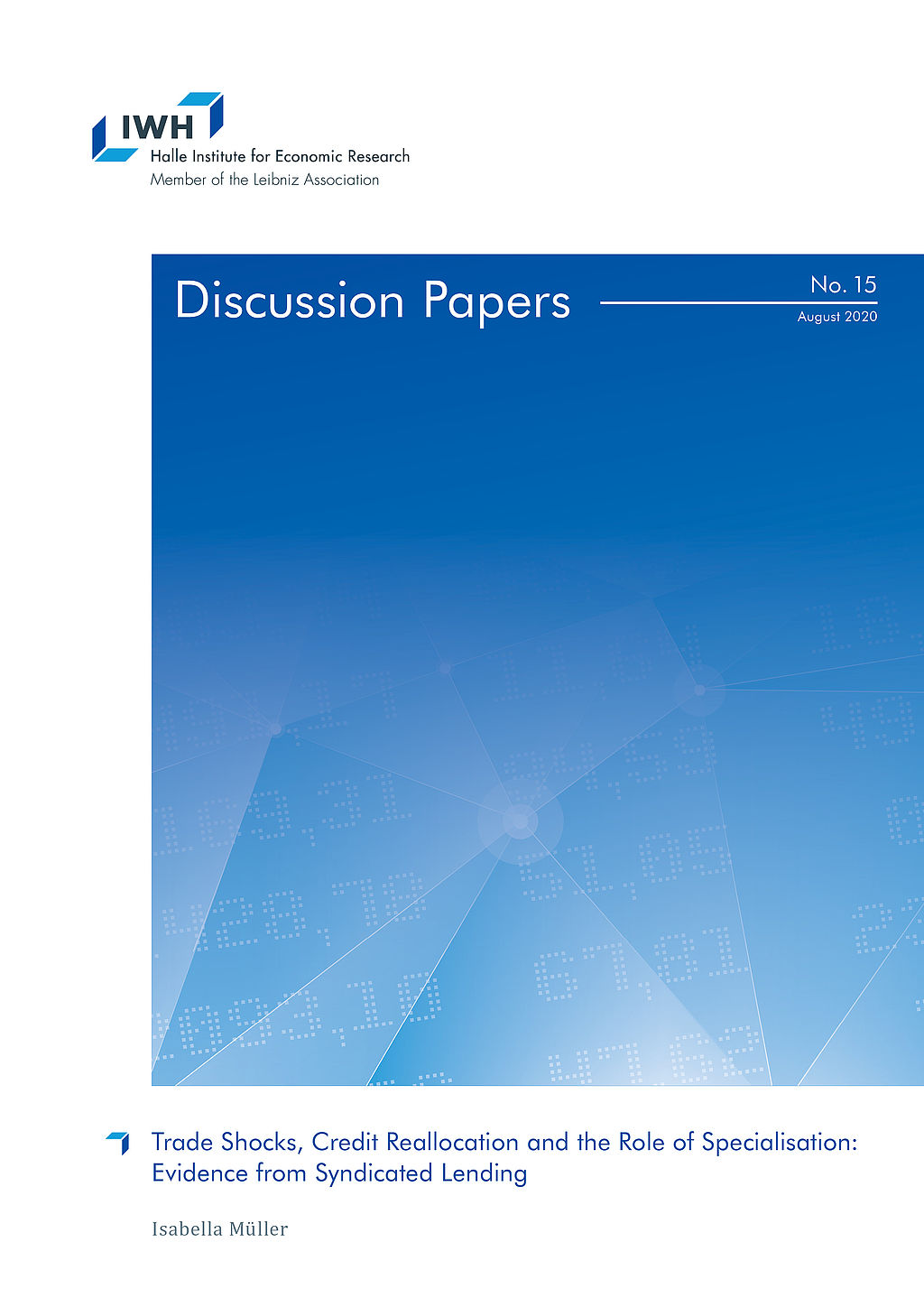
Trade Shocks, Credit Reallocation and the Role of Specialisation: Evidence from Syndicated Lending
in: IWH Discussion Papers, Nr. 15, 2020
Abstract
This paper provides evidence that banks cut lending to US borrowers as a consequence of a trade shock. This adverse reaction is stronger for banks with higher ex-ante lending to US industries hit by the trade shock. Importantly, I document large heterogeneity in banks‘ reaction depending on their sectoral specialisation. Banks shield industries in which they are specialised in and at the same time reduce the availability of credit to industries they are not specialised in. The latter is driven by low-capital banks and lending to firms that are themselves hit by the trade shock. Banks‘ adjustments have adverse real effects.

Spillovers of Asset Purchases Within the Real Sector: Win-Win or Joy and Sorrow?
in: IWH Discussion Papers, Nr. 22, 2019
Abstract
Events which have an adverse or positive effect on some firms can disseminate through the economy to firms which are not directly affected. By exploiting the first large sovereign bond purchase programme of the ECB, this paper investigates whether more lending to some firms spill over to firms in the surroundings of direct beneficiaries. Firms operating in the same industry and region invest less and reduce employment. The paper shows the importance to consider spillover effects when assessing unconventional monetary policies: Differences between treatment and control groups can be entirely attributed to negative effects on the control group.


















